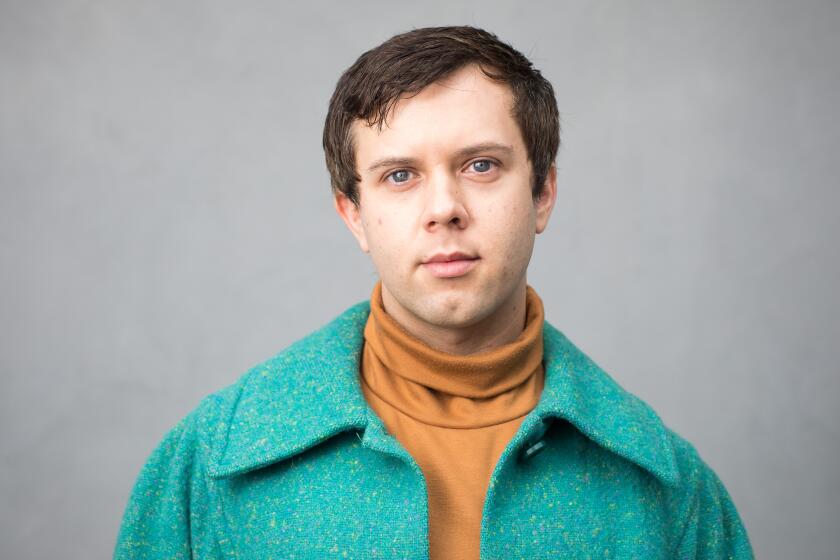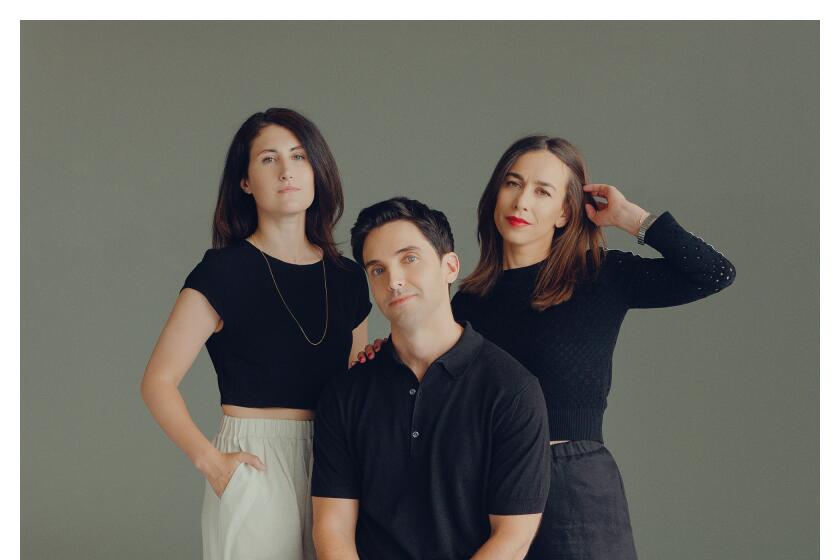- Share via
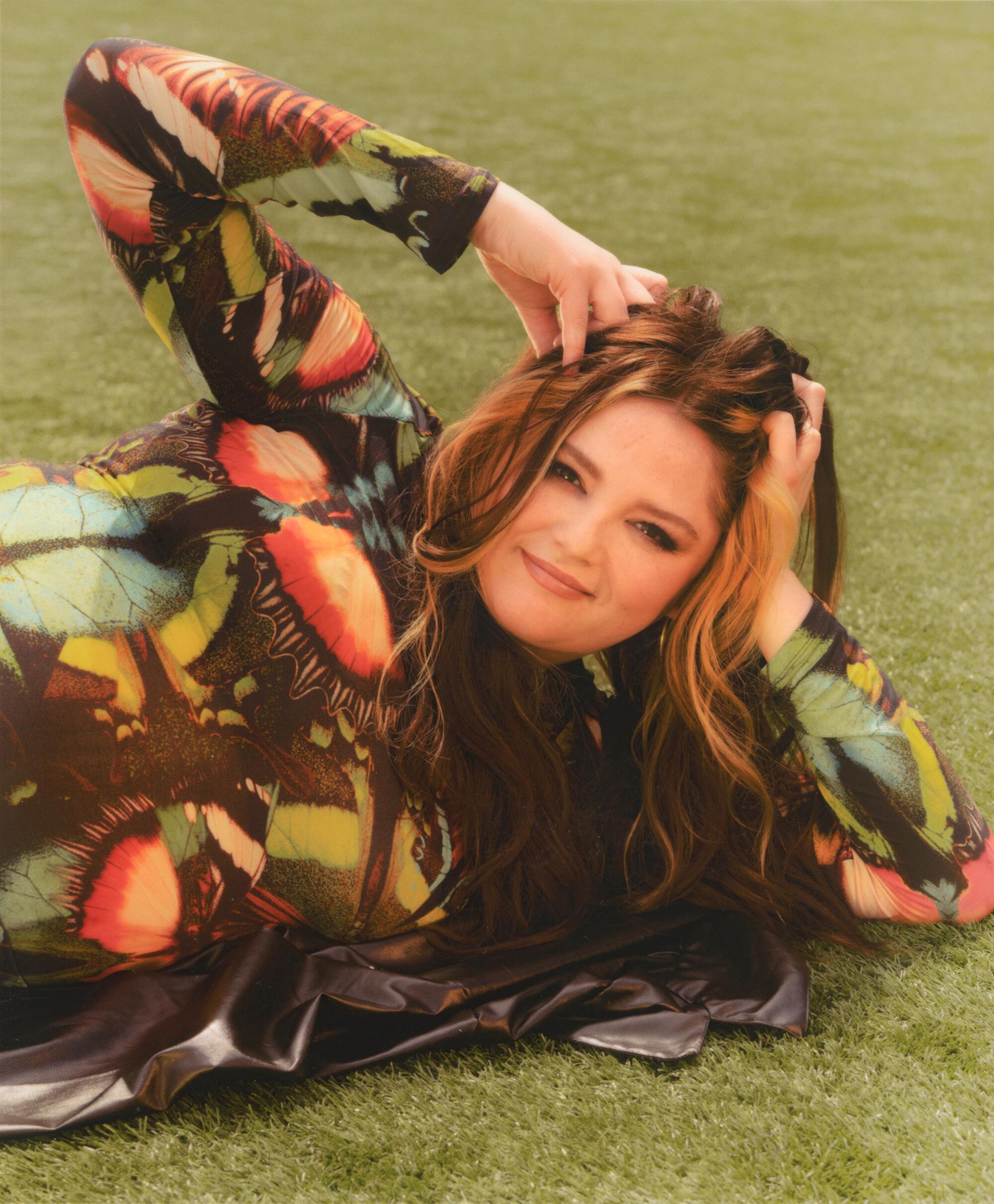
Megan Stalter was glancing at an antique spinning wheel in the guest room of her mother’s house in Ohio last June when, suddenly, inspiration struck. It was Pride month, when corporations issue bland, often unconvincing statements of support for the LGBTQ community.
For the record:
11:52 a.m. May 18, 2022An earlier version of this article misstated that Megan Stalter will soon film the indie movie “Cora Bora.” It has already wrapped shooting.
A thought occurred to her: Wouldn’t it be funny if a store with a down-home aesthetic (think Cracker Barrel) made a Pride commercial?
Stalter had a few minutes to kill before her mom picked her up for a shopping trip, so in a single take she recorded a video that quickly went viral. In a pair of braids and her signature winged eyeliner, the comedian posed stiffly in front of the spinning wheel and launched into a clumsy sales pitch for a fictional establishment called Cecily’s Butter Shop.
“Hi, Gay! Happy Pride month! This month we are sashaying away with deals,” she said through a forced grin, plugging the discounts available to anyone “if you can prove that you’re queer.” “We’ve been making butter since 1945. And we’ve been accepting all people since” — she paused — “the last four months.”
Bossy, bumbling, prone to malapropisms and anxious tics, the butter store employee displayed the hallmarks of what has fast become a comedic archetype: the Megan Stalter character.
With a key scene in its Season 1 finale, HBO Max’s comedy crystallizes the way it turned generational conflict into a kind of romantic comedy.
“I love to play people that are a little bit in their own world, yet there’s something endearing about them,” said the actor, 31, during a recent video chat from her home in Los Angeles. “Someone whose house is burning down but they have a smile on their face. And they’re like, ‘Everything is fine!’ when it’s not.”
Stalter’s profile ascended rapidly during the early days of the pandemic, when she performed nightly on Instagram Live from her Brooklyn apartment and shared a staggering number of “front-facing comedy” videos, or solo character sketches recorded on a smartphone. In addition to “Hi Gay!,” probably her biggest hit to date, there’s “woman who doesn’t realize she joined a cult,” “woman who accidentally says ‘you too’ after someone tells her to have a good flight,” “influencer mommy who keeps getting interrupted,” and many others. She epitomized a new generation of DIY comedy stars, like Cole Escola and Ziwe Fumudoh, who distributed their own content on social media when traditional venues were closed.
Increasingly, though, Stalter has brought her lovably unhinged alter egos to projects filmed outside her living quarters.
This month she reprises her breakout role as Kayla, a clueless Hollywood assistant brimming with self-assurance yet utterly lacking self-awareness, in the HBO Max comedy “Hacks,” and recently performed during the Netflix Is a Joke comedy festival. She’ll also appear in Peacock’s reboot of “Queer as Folk,” premiering next month, and “Cora Bora,” an indie comedy about a millennial in an open relationship.
“Every year since me deciding to, like, really go after what I wanted to do in life has been better than the next,” Stalter said. “My life already is better than I ever could expect. My dreams are already coming true. And I feel so lucky. Because how often does it get to happen?”
With seafoam green eyeshadow and Gloria Steinem-esque streaked hair framing her face, Stalter shares a flamboyant sense of style with the characters she plays, if not their brash entitlement. She is, at heart, “deeply Midwestern — very Ohio,” according to her friend Aidy Bryant (“Saturday Night Live,” “Shrill”). “That was something I connected with her on, because I felt the same way. I came from Arizona and had no idea what was going on: ‘How do I navigate this stuff?’ We have similar approaches as far as trying to hold on to who we are from growing up while also making it in this business.”
“No one wants a TV show more than Cole Escola,” Amy Sedaris says of the rising star, who once turned to sex work to make ends meet. “And they deserve it.”
The eldest of four children, Stalter grew up in Dayton, Ohio. Unlike Kayla, a showbiz nepotism baby, she was not rich or well connected; her mom was a nurse and her dad a tattoo artist. They were divorced, and Stalter spent a lot of time caring for younger siblings.
But Stalter was surrounded by funny women and, from a young age, felt a powerful need to be onstage.
“When I fell asleep at night as a kid, I always imagined I was on the ‘E! True Hollywood Story,’” she said. “Superstar,” the movie starring Molly Shannon as chaotic, fame-hungry Catholic schoolgirl Mary Katherine Gallagher, “was life-changing.” Stalter once scrambled to put together a dance routine when her Catholic elementary school put on a talent show and loved to make age-inappropriate home movies with her many cousins using the family camcorder.
“There was something in me that always thought I was special. Even when I was really bad. And I don’t know where it came from,” Stalter added. “Probably my mother loving me too much or something.”
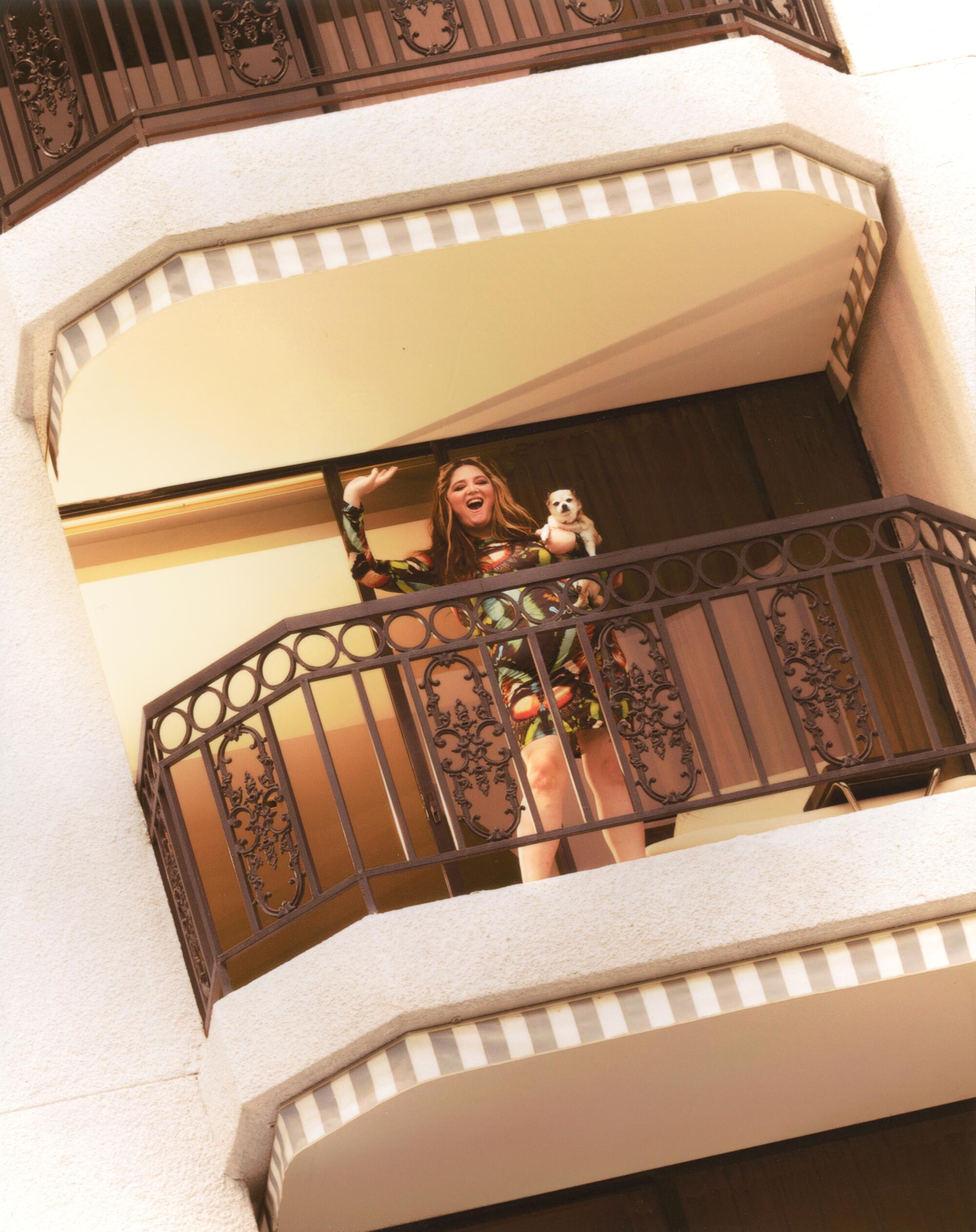
Though she was usually relegated to supporting roles in high-school theater — “Nun No. 5,” as she put it — Stalter displayed a knack for offstage improvisation. She and her boyfriend worked at her stepfather’s telemarketing company and would play a game where they earned points by working unexpected phrases (e.g., “Would you like waffles?”) into their sales calls. (This boyfriend was gay, but Stalter didn’t mind: “We never kissed with our mouths open but we were, like, the power couple in drama club.”)
After high school, she took community college classes in nursing and education and spent time in Peru as a missionary because, she said, “I loved God and I loved people.” (Though she went to Catholic school, Stalter and her family attended a “pretty wild” Pentecostal church; she now says she considers herself spiritual but no longer goes to church.) She returned from a long trip abroad with a realization: “What God wants me to do is what I really want to do. So why not take an improv class?”
She soon moved to Chicago to pursue comedy — “the best decision of my life,” she said — and stayed for seven years, making ends meet as a nanny and performing in her free time. During this period, which she likens to “comedy school,” Stalter also realized she was bisexual when she bonded with a woman who had also dated her terrible ex-boyfriend and the friendship blossomed into a short-lived romance. “We both thought we were straight and then she started texting me like, ‘Oh, that felt like kind of like a date.’ That’s when I was like, ‘I’m really curious about this.’”
By 2019, Stalter had moved to New York and was making a name for herself in the alt-comedy scene with her surreal stand-up act. Then COVID arrived, clubs shut down, her roommates fled the city — and she blew up on social media. “It was really strange to feel like people were finally watching my stuff but then to feel more alone than ever before,” she said.
With Jean Smart as an aging comic, the series showrunners keep the focus on the woman, not the stand-up act.
Comedian Mae Martin was one of the many people riveted by Stalter’s nightly improv marathons on Instagram Live at the height of lockdown. “And it’s like, (a) why does this woman have all these wigs and props in her apartment, and (b) why is she for two hours straight just on her own dancing and screaming and talking to people? I’d never seen anything like that,” Martin said.
Martin and Stalter struck up a friendship online, then met in person months later in L.A. Martin was struck by Stalter’s warmth and hilarity — traits comedians do not necessarily exhibit offstage. Martin recalled how, one night, they were making prank phone calls and Stalter, who had called a hotel to warn them people should be kept out of the pool because she and her husband had just had sex in it, befriended the woman who answered the phone.

“She ended up talking to this woman for 45 minutes and then sending her a fettuccine Alfredo on Uber Eats,” Martin said. “By the end of the phone call, they were like, ‘Love you, girl!’
Paul W. Downs, who co-created “Hacks” and plays Kayla’s beleaguered boss, a talent manager named Jimmy, was similarly impressed by Stalter’s ability to connect with so many people during a period of isolation. “I think some performers were like, ‘I’m gonna wait till I can tour again,’ but she just had no ego about it and was never ‘too good’ to just do front-facing videos,” he said.
With “Hacks” co-creators Jen Statsky and Lucia Aniello, Downs had developed the character of Kayla based on a real person they’d met in the industry. “One of the defining qualities of that person is that she was incredibly self-assured and, weirdly, at the same time, nervous and inept,” he said.
Downs first saw Stalter perform at Little Joy in Echo Park, not long before the pandemic, and describes her act as “alt in every sense of the word. She’s a live wire and an open channel, and I don’t know that even she knows where she’s going.”
He also felt like there was something about the tortured syntax and stuttering cadence of her characters that was just right for Kayla.
Stalter eventually got the call to audition for “Hacks,” which would be her first significant TV role. By then, a friend who worked on the show had sent her a screenshot of a section of the script that compared Kayla to Megan Stalter. “And then I felt like there was a lot of pressure to get the part,” she said. Stalter put herself on tape, in her brother’s “horrible” New York apartment, as dogs barked in the background. It worked.
The tension between Jimmy and Kayla, whose father happens to run the agency where they work, was a highlight of the show’s Emmy-winning first season. This season, as stand-up legend Deborah Vance (Jean Smart) and up-and-coming writer Ava Daniels (Hannah Einbinder) hit the road for a cross-country tour, Kayla comes under review by HR for trying to seduce Jimmy during a work trip to Las Vegas. But their odd-couple relationship develops more nuance in the episodes ahead — a reflection, perhaps, of the likability Stalter brings to a character who could easily be a broad caricature of entitlement and privilege. She has somehow made the Megan Stalter Character, well, more like Megan Stalter.
“If you’re doing what you really want to do,” Stalter says, “if you have a good heart and good intentions and know what’s real and what’s important — your friends and your family and getting to create stuff that means something to you — then things just keep getting better.”
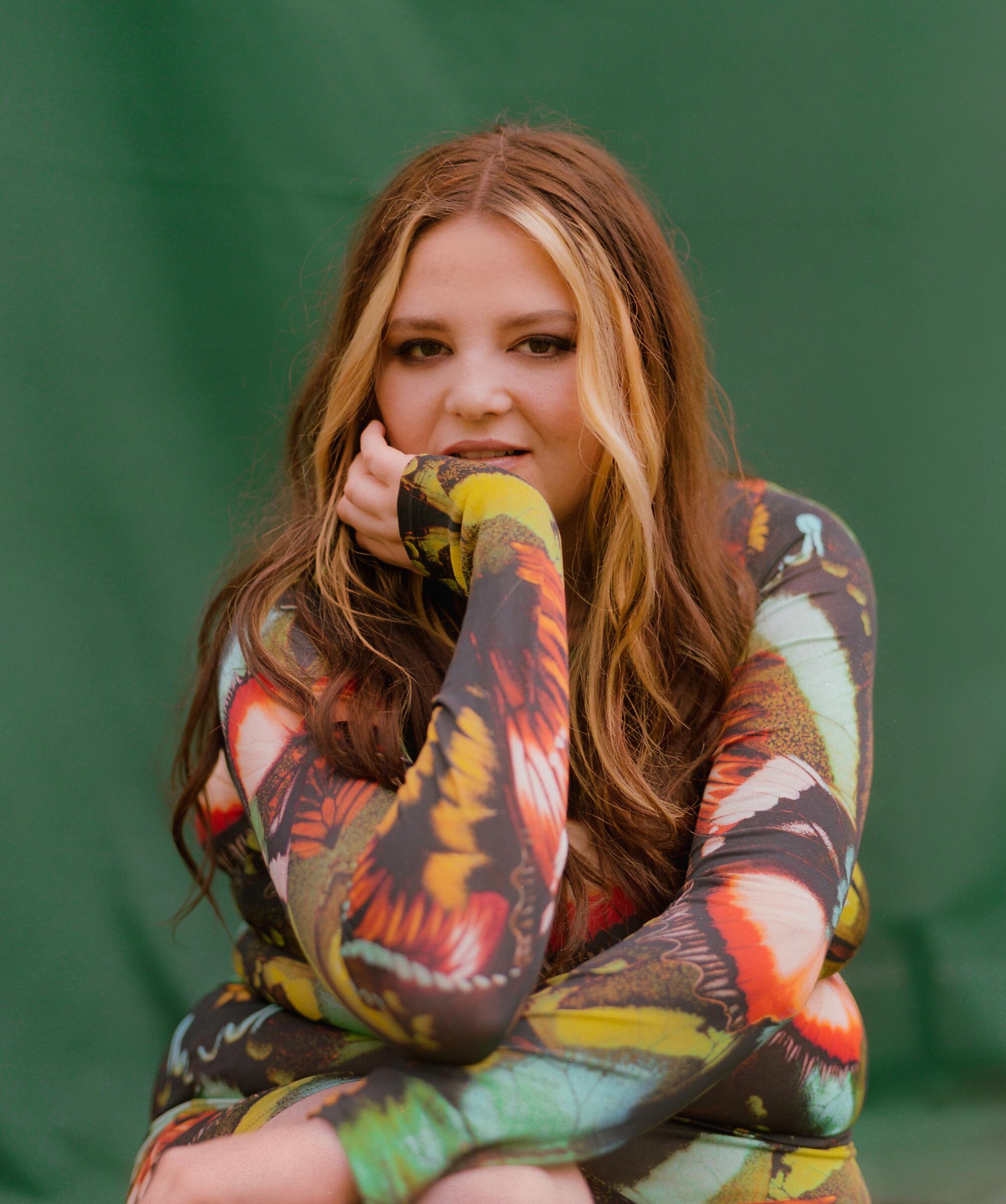
‘Hacks’
Where: HBO Max
When: Anytime
Rating: TV-MA (may be unsuitable for children under the age of 17)
More to Read
The complete guide to home viewing
Get Screen Gab for everything about the TV shows and streaming movies everyone’s talking about.
You may occasionally receive promotional content from the Los Angeles Times.
